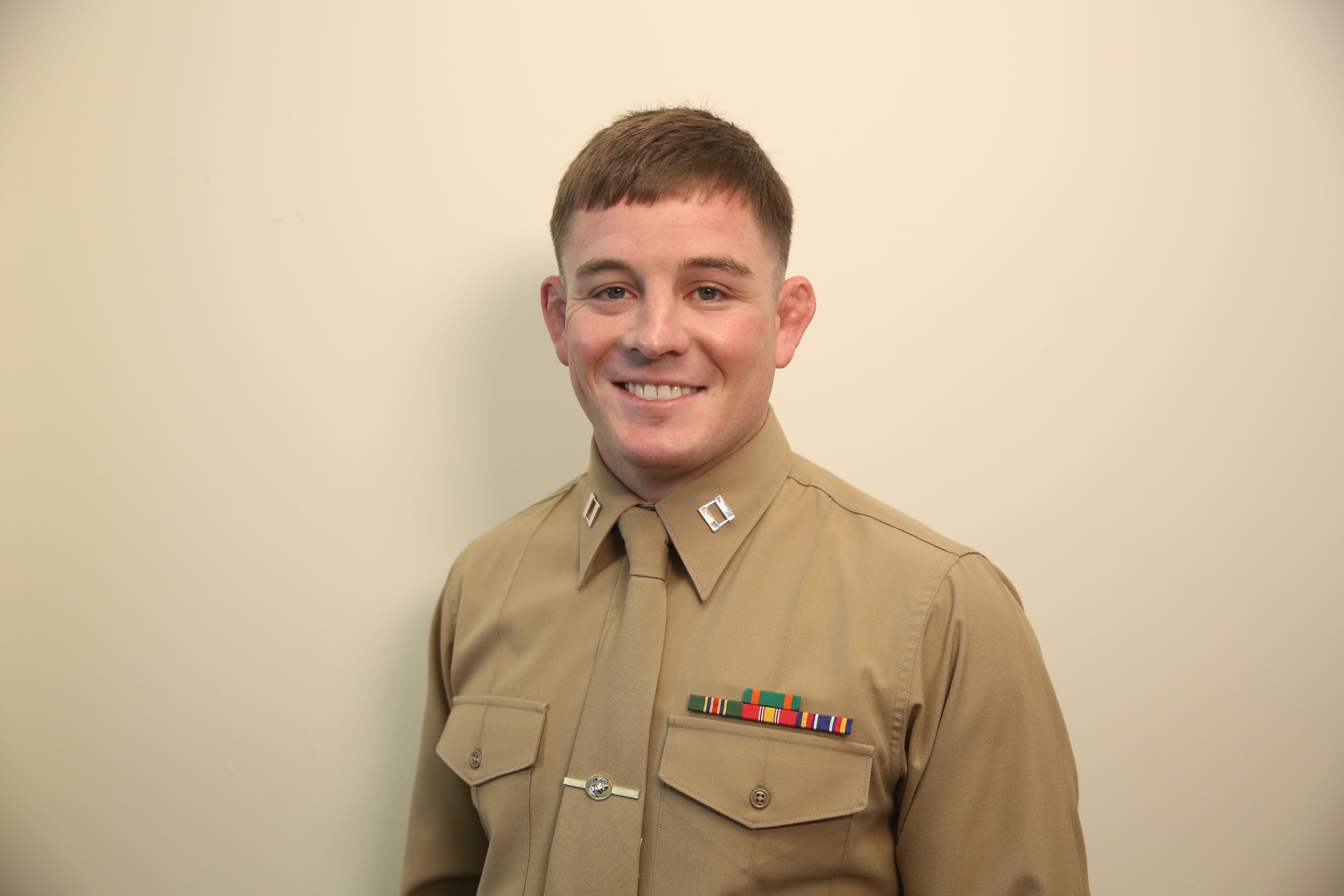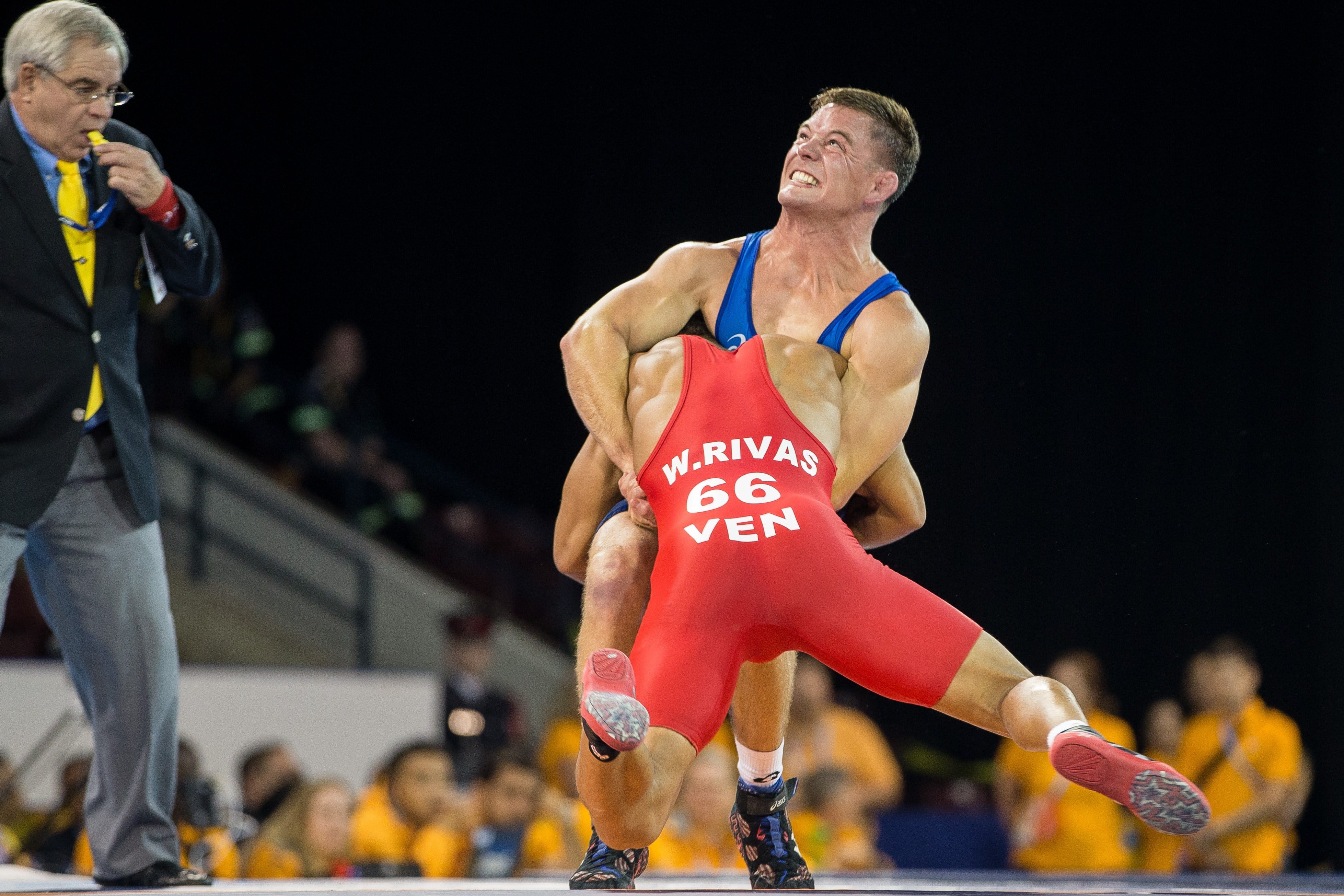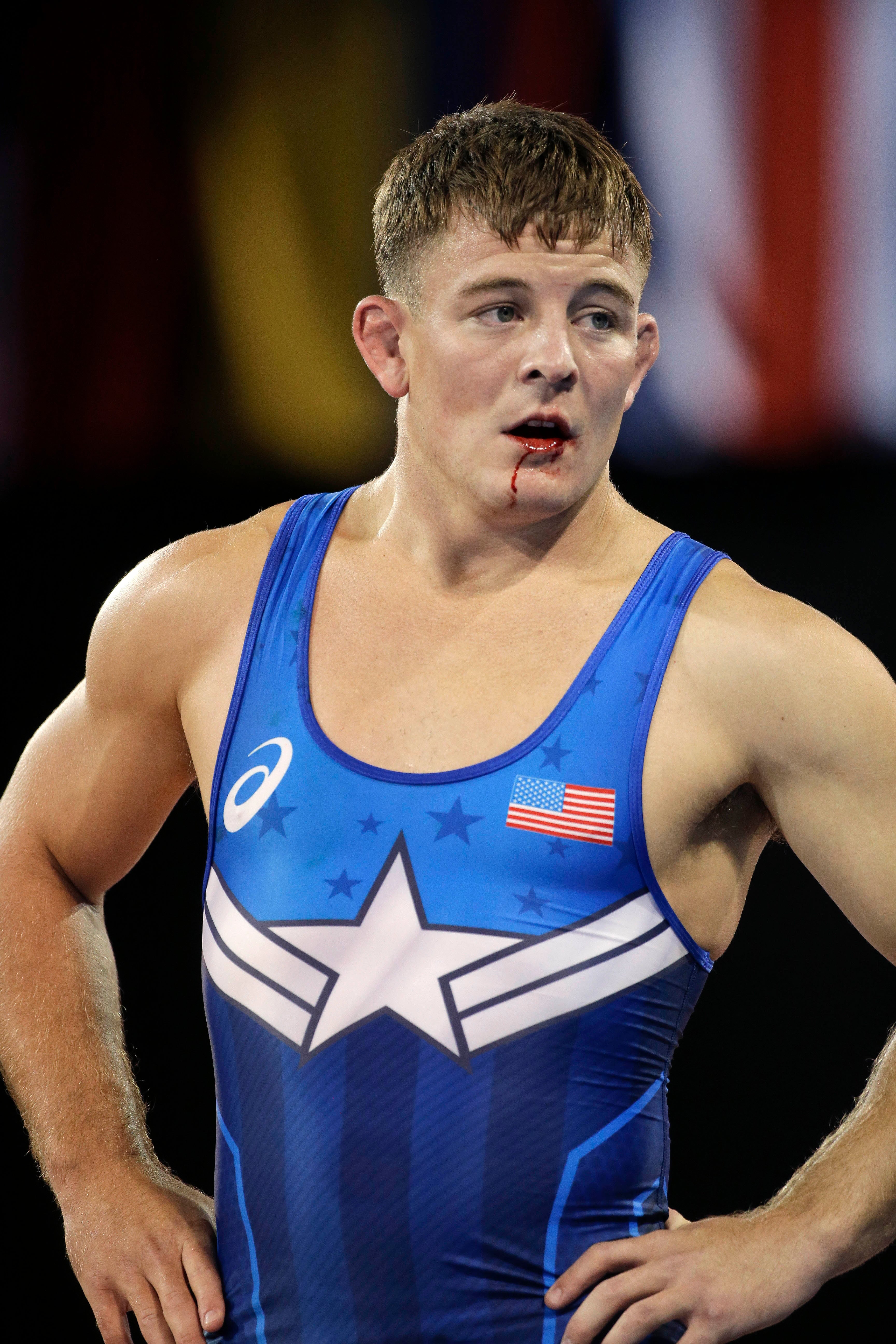Editor's note: This story was updated Jan. 29 to include responses from Marine Corps Manpower and Reserve Affairs.
The Marine Corps' Male Athlete of the Year expected to battle in August during the Summer Olympics in Rio de Janeiro, Brazil, where he is favored to win a medal. What Capt. Bryce Saddoris didn't see coming was the battle to save his Marine Corps career.
The Marine Corps' Male Athlete of the Year has been facing the fight of his life. This battle did not take place in the Summer Olympics, where Capt. Bryce Saddoris is favored to medal. It was a fight to keep his Marine Corps career.
The top-ranked wrestler didn’t make the cut when manpower officials picked officers from his class to remain on active duty, the all-important career designation, and that left many bewildered supporters were crying foul.
They pointed out that Saddoris, they pointed out, had excelled at everything he has been asked to do; his fitness reports were as strong as they come. Others argued that Saddoris should not be discharged, but rather commended for having successfully fulfilled his assignment as officer-in-charge of the Marine Corps' wrestling team.
His 40 Marines, who range in rank from private first class to gunnery sergeant, are under constant pressure to qualify for a tournament, make weight, and successfully compete on the world stage. The tTeam members serves as unofficial ambassadors in dozens of countries and help recruiters of top high school and collegiate athletes. The Marines spend upwards of six months on the road annually, which takes its toll on career progression and family relations. Still, more than one dozen earned promotions and six have emerged as Olympic hopefuls.
But this pace left Saddoris too little time to earn career designation as a supply officer. He submitted a package in the hopes of getting a meritorious exception, to no avail. The career clock is ticking. Unless someone with significant pull intervenes on his behalf, Saddoris was on track to become a civilian in May — three months before he is expected to step on the Olympic stage in Rio de Janeiro, Brazil.
Marine Corps Times first learned of Saddoris' predicament in mid-January and submitted queries about the captain's situation and the career designation process as a whole. Saddoris got word Jan. 21 that he'd get to remain in uniform.
"Through another medium, leadership was made aware of the situation the same day as the Marine Corps Times media query," said Maj. Rob Dolan, a spokesman for Manpower and Reserve Affairs. "Other authorities out there were exercised to career designate Saddoris due to the context of the situation.
"We've got a good Marine officer who was put in a billet based on his unique athletic abilities to perform on the world stage, representing the U.S.A. and all service members. ... Based on his capabilities, we feel he is just as competitive as his peers and will have ample time to mature in his [military occupational specialty]."

Marine Capt. Bryce Saddoris, left, earned a silver medal at the July Pan Am Games in Mississauga, Ontario.
Photo Credit: AP
In an interview with Marine Corps Times before he found out he'd get to remain in uniform, Saddoris said the months-long plight made him feel powerless.
Indeed, the odds are stacked against him, but don't count him out just yet.
"When I am out there in the middle of a match, I have a say so. Right now, I really don't," he said. "That is frustrating. I could just throw my hands up and quit, but that's not me. I'm down, but I'm not out."
'I am a Marine first'
Saddoris, 27, is a four-time state wrestling champion, two-time All-American, and is the most successful wrestler in Naval Academy history with 147 wins. The 2015 U.S. Open Greco-Roman champion has been ranked No. 1 in the U.S. nited States the past two years and is ranked No. 1 in the world in the 146-pound weight class.
But in his mind, such titles come second to that of Marine.
"I've always made it known that I am a Marine's first," he said. "I'm not looking to stay in the Marine Corps just so I can do this for the next 20 years. I'm 27 years old. In the athletic world, I'm a grandpa. I'm the old guy. I'm wrestling kids under 18 and 19 years old. I don't have that much longer as far as competing.
"I would be happy to stay with the team and help develop up-and-coming Marines, I would be happy going to the fleet. Whichever way it goes, I am comfortable with that."
To see Saddoris stay in uniform would seem a long shot. Much to his disbelief, Saddoris shock, he was not offered career designation late last year. That is offered to "the best qualified officers" in their fifth year of active commissioned service. The competitive process is based on an officer’s official record and designed to retain those with the best potential.

Capt. Bryce Saddoris, a supply officer and officer-in-charge of the Marine Corps' wrestling team was nearly forced out of the Marine Corps after being named the service's top athlete.
Photo Credit: Marine Corps
In this latest round, the Officer Retention Board selected 564 of 667 officers for career designation. Quotas were set at 95 percent of qualified and eligible aviation officers, 80 percent in aviation support, 80 percent in combat arms, 80 percent in combat service support, and 85 percent in law.
The 103 who were not selected still had one more shot, as 20 meritorious quotas were allocated to Marine Forces commanding generals. Only three officers were nominated, and all were approved, according to personnel officials. Saddoris' command said they submitted a meritorious package, but he learned in late December that he would not nab one of the spots.
"Captain Sadorris' recommendation for meritorious career designation went up the chain of command and was not initially endorsed, so it went no further," Dolan said.
Capt. Joseph Bromen, the reserve, retention and release officer at Manpower Management Officer Assignment who is the ORB sponsor and oversees the career designation process, said the Officer Retention Board systems are "fair and equitable."
"This headquarters received and approved three [meritorious] nominations ... Capt. Saddoris was not amongst them," he said. said Capt. Joseph Bromen, Reserve, Retention, and Release Officer at Manpower Management Officer Assignment who is the ORB sponsor and oversees the career designation process. "At what point Capt. Saddoris' nomination was disapproved or negatively endorsed, I cannot say. I also do not know for sure what means the MARFOR CG's used to determine who they would nominate. In the end, I trust that they used a fair and equitable system."
Marine Corps Order 1001.65, does not stipulate the way in which commanding generals select Marines for nomination, nor does it stipulate the criteria for nomination other than the fact the Marine was screened and not selected on the last ORB.
It appeared was looking like Saddoris' was down to his last option: transferring to the rReserve component to complete his remaining obligated service. The Reserve component "offers many opportunities to Marines, including [military occupational specialty] MOS retraining, direct affiliation bonuses, promotion and career advancement, as well as individual mobilization augmentee billet and deployment opportunities," said Capt. Joseph Bromen, the reserve, retention and release officer at Manpower Management Officer Assignment, in mid-January.
"Additionally, Capt. Saddoris will have the opportunity to apply to the Return to Active Duty Program ... (ran in conjunction with the ORB) if he so chooses," he added.
Luckily for Saddoris, it didn't come to that.
Treat Marine athletes like musicians
For a time, Saddoris' only hope to remain on active duty was that a general, congressman, or defense official with the power to reverse the decision got in his corner. And Saddoris deserved nothing less this in the eyes of his supporters — and the The Marine Corps deserveds this it in the eyes of his commanders.
"All of the things that he has done [are]is exactly what a Marine leader is supposed to do," said Capt. Sharon Hyland, Saddoris’ company commander. "Someone might think [being a Marine wrestler] is focusing or shifting his attention away, but it is the exact opposite. We are trying to put into perspective what his accomplishments have been as a Marine officer because I'm not sure if they are translating properly."
The grappler also received high praise from Col. Chandler Seagraves, commanding officer of Camp Lejeune's Headquarters and Support Battalion. Seagraves said the young captain will succeed at anything, and is "exactly what we expect out of our Marine Corps officers."
The colonel is concerned about the message sent to young athletes interested in military service, as well as those already in uniform.
"If this kid stays on track, he's going to be wearing a gold medal," Seagraves said. "These guys are world-class athletes. Just about every Marine on that team is at least a state champion before they [are] were ever put on this team. We need to understand that they carry a specific talent, and determine how we can utilize the talent within the Marine Corps."

Marine Capt. Bryce Saddoris, in blue, tries to throw Wuileixis Rivas of Venezuela during their gold medal bout in the 66kg class of the men's greco-roman wrestling at the 2015 Pan American Games in Toronto, Canada, in July.
Photo Credit: AFP/Getty Images
It is a concern shared by Saddoris, who believes many Marines would excel in competition but are increasingly hesitant to step forward for fear of career ramifications. The Marine Corps athletic program is a good thing, he said.
"We are doing what Marines do and we are developing them, making them mentally tougher, more disciplined and harder working," Saddoris said. "The product that we give back to the units is much better."
Seagraves said the Marine Corps should mirror the career path offered to professional musicians for its best athletes. The Marine Corps recognizes such talent in musicians and provides them with a career path. Those Marines Musicians are still riflemen, and so are athletes, Seagraves said. Marines like But unless called to that capacity, tThey could manage command fitness programs or develop training regimens for Marine Special Operations Command and the like until called on to serve in another capacity.
"This guy knows everything about nutrition and physical training," Seagraves said. "That is a capacity he could provide to the Marine Corps down the road if he could stay in. Use his expertise and keep his leadership abilities, instead of just taking one measure of 'how is he as a supply officer?'"
As a former member of the Blue Angels, Seagraves knows all too well the immeasurable worth such programs bring to recruiting and international relations. He also gave a nod to the sister services, where many athletic programs are viewed as professions.
The Army has a program for its top athletes. Called the U.S. Army World Class Athlete Program, the unit's primary mission is to provide support and training for soldiers competing in national and international competitions leading to the Olympics. And they do that all while maintaining professional military careers. The Army Marksmanship Unit is one example of that type of opportunity. the example par excellence.
"I understand we don't have the bodies to do that, but we can do better," Seagraves said.
Bromen, who oversees the career designation process, had a different take when asked if Saddoris' example might send the message that Marines should forego participation in service athletics.
"The Marine Corps is grateful for Capt. Saddoris' service," he said. "I am sure that Capt. Saddoris is also grateful for the opportunity afforded to him by the Marine Corps. He has had a fulfilling and successful tour of active duty service, and no doubt, has advanced his skills as a wrestler, a leader and a warfighter," he said.
"Contrary to what your question implies, I believe that Capt. Saddoris' service would be an example of the bountiful opportunities provided to Marines to participate in athletic activities," Bromen continued. "Capt. Saddoris wrestled at the Naval Academy, and after commissioning and MOS school, was afforded the opportunity to continue his wrestling career while being paid as a Marine officer on active duty. He gained valuable leadership experience, a college degree at a premier institution of learning, and had valuable support and sponsorship in continuing his wresting career. I know of no other program where aspiring Olympic athletes are afforded these opportunities.
"In addition, Capt. Saddoris earned the title Marine. His is, and will always be, a Marine. I think I speak for all Marines, past and present, when I say that I wish Capt. Saddoris the best in his future endeavors as a wrestler and a Reserve officer.
"I will be watching and cheering for him as he competes in the upcoming Olympics," Bromen said. "And when he wins, I assure you that all Marines will be proud of his accomplishment. It will not just be Bryce Saddoris that wins the gold medal. It will be Capt. Bryce Saddoris, United State Marine."
Going forward, Dolan said Saddoris will have to compete for promotion among his peers by returning to his primary MOS and performing the duties associated with that at a high level.
"If past behavior is any indicator of future performance, we are confident this Marine has the work ethic to continue to develop into a fine leader of Marines," Dolan said.
Marine and Olympic hopeful
Saddoris is no stranger to challenge, and he never backs down from a fight.
He did not medal at the past world championship, but don't let that fool you. Saddoris immediately went up by four points, then broke the orbital bone around his eye orbital. The injury was so severe that it took it would take two surgeries to fix.
Despite the pain and double vision — and to the amazement of tournament doctors — he toughed it out to finish the match, losing 5-4.
When asked why he kept fighting, his response was simple: "That is what a Marine does."

Marine Capt. Bryce Saddoris waits for medical help after getting cut during his 66 kg gold medal bout against Wuileixis Rivas, of Venezuela, in the gold medal match in men's Greco-Roman wrestling at the July Pan Am Games in Canada.
Photo Credit: AP
Amid his battle to stay in uniform, Saddoris must also earn his spot on the U.S. Olympic team. The 5-foot, 7-inch Nevada native has been a member of the world team the past two years (the world team is equivalent to an Olympic team, but exist in a non-Olympic year). He must win two of three matches in April to make qualify for the Rio games. He has wrestled all the top competitors before, and knows them well
"This Olympic spot is mine to lose," he said.
He puts himself through two rigorous training regimens daily, which total no less than six hours. These are fueled by a careful and calculated diet. Between wind sprints, he may toss around 100-pound dummies and belt out 120 pull-ups in 10 minutes. And don't forget the twice-daily, full-on sparring with Marines of similar strength and stature (there is no shadowboxing in wrestling).
Saddoris knows well what he must do to achieve his Olympic dream. And despite a unique career path as a Marine, Saddoris is confident he has more to offer the Corps. To keep his dream of a Marine Corps career alive is another matter.
"Because I have a unique set of talents, that the Marine Corps saw fit for me to use them and for me to be a different ambassador for the Marine Corps, a different type of leader," he said. "I have taken those duties and I have taken the skills and I have done the best I possibly could have done these past five years. No matter the outcome, I look back on my career and know that I gave it everything and there wasn't one day that I thought, ‘I'm done, I want to be out of the Marine Corps.’ I'm fighting to stay in the Marine Corps because I want to be a Marine."
Now he will get that opportunity.
Lance M. Bacon is senior reporter for Marine Corps Times. He covers Marine Corps Combat Development Command, Marine Corps Forces Command, personnel/career issues, Marine Corps Logistics Command, East Coast Marines and Marine Forces North. He can be reached at lance.bacon@hotmail.com.




